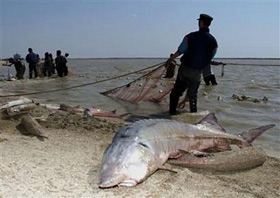 |
 |
 |
 Entertainment | Restaurants & Dining | January 2006 Entertainment | Restaurants & Dining | January 2006  
UN Moves To Block 2006 Caspian Sea Caviar Exports
 Reuters Reuters


| | Kazakh fishermen drag a net loaded with sturgeon in the Ural River near the Caspian port of Atyrau in Kazakhstan. (Shamil Zhumatov/Reuters) |
The United Nations said on Tuesday it would not approve 2006 caviar export quotas for the Caspian Sea basin, where most of the delicacy is produced, until it had more information on stock levels and illegal sales.

The decision, in effect an export ban, covers foreign sales from Azerbaijan, Russia, Iran and Kazakhstan, which were allowed to ship 105,000 kg of caviar and other sturgeon products in 2005.

The U.N. Convention on International Trade in Endangered Species of Wild Fauna and Flora (CITES) said it was worried the quota requests for this year - which it did not detail - did not take full account of stock declines and illegal fishing.

"Countries wishing to export sturgeon products ... must demonstrate that their proposed catch and export quotas reflect current population trends," said CITES Secretary-General Willem Wijnstekers.

"To do this they must also make full allowance for the amount of fish caught illegally," he added in a statement.

Officials said quotas sought for 2006 were below those of 2005, which in turn fell from the 147,000 kg granted in 2004. It is not known how much caviar was actually exported in 2005.

"The export quota has been coming down, but so too has the population of the species," CITES chief scientist David Morgan told Reuters.

The conservation agency needed a clearer idea of how the quota requests had been arrived at before it would give the go ahead to further sales, he added.

The call to importers, mainly in the European Union and the United States, not to buy caviar would remain in force until the information was provided, he added.

CITES' 169 member states have set strict conditions for caviar exports, including a prior accord between producers on amounts, along with a stock assessment and management plan.

They have the power to ban any state that flouts the rules from trading in the respective endangered species.

From the start of 2006, sturgeon products must be caught within the same calendar year they are sold, so carryover stock from 2005 cannot be exported as a way of getting round the absence of quotas for 2006.

But industry officials say that the black market in caviar, which retails at 2,000-6,000 euros ($2,400-$7,150) a kg, is about the same as the legal market at some 100 tonnes a year. | 
 | |
 |



